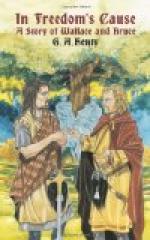Chapter X The Battle of Falkirk
While Wallace was endeavouring to restore order in Scotland, Edward was straining every nerve to renew his invasion. He himself was upon the Continent, but he made various concessions to his barons and great towns to induce them to aid him heartily, and issued writs calling upon the whole nobility remaining at home, as they valued his honour and that of England, to meet at York on January 20th, “and proceed under the Earl of Surrey to repress and chastise the audacity of the Scots.” At the same time he despatched special letters to those of the Scottish nobles who were not already in England, commanding them to attend at the rendezvous.
The call upon the Scotch nobles was not generally responded to. They had lost much of their power over their vassals, many of whom had fought under Wallace in spite of the abstention of their lords. It was clear, too, that if they joined the English, and another defeat of the latter took place, their countrymen might no longer condone their treachery, but their titles and estates might be confiscated. Consequently but few of them presented themselves at York. There, however, the English nobles gathered in force. The Earls of Surrey, Gloucester, and Arundel; the Earl Mareschal and the great Constable were there; Guido, son of the Earl of Warwick, represented his father. Percy was there, John de Wathe, John de Seagrave, and very many other barons, the great array consisting of 2000 horsemen heavily armed, 1200 light horsemen, and 100,000 foot soldiers.
Sir Aymer de Vallance, Earl of Pembroke, and Sir John Sieward, son of the Earl of March, landed with an army in Fife, and proceeded to burn and waste. They were met by a Scotch force under Wallace in the forest of Black Ironside, and were totally defeated.
Surrey’s army crossed the Border, raised the siege of Roxburgh, and advanced as far as Kelso. Wallace did not venture to oppose so enormous a force, but wasted the country on every side so that they could draw no provisions from it, and Surrey was forced to fall back to Berwick; this town was being besieged by a Scottish force, which retired at his approach. Here the English army halted upon receipt of orders from Edward to wait his coming. He had hastily patched up a peace with France, and, having landed at Sandwich, summoned the parliament, and on the 27th of May issued writs to as many as 154 of his great barons to meet him at Roxburgh on the 24th of June. Here 3000 cavalry, men and horses clothed in complete armour; 4000 lighter cavalry, the riders being armed in steel but the horses being uncovered; 500 splendidly mounted knights and men-at-arms from Gascony; and at least 80,000 infantry assembled together, with abundance of materials and munition of war of all kinds. This huge army marched from Roxburgh, keeping near the coast, receiving provisions from a fleet which sailed along beside them. But in spite of this precaution it was grievously straitened, and was delayed for a month near Edinburgh, as Wallace so wasted the country that the army were almost famished, and by no efforts were they able to bring on a battle with the Scots, whose rapid marches and intimate acquaintance with the country baffled all the efforts of the English leaders to force on an action.




